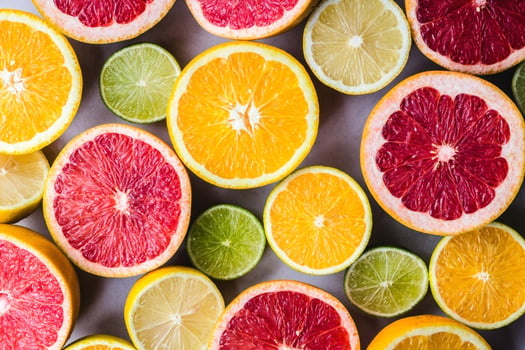Not only does a balanced diet full of vitamins and minerals help our body to look and feel good… it also contributes towards a healthy smile.
The human body needs vitamins and minerals to support almost every bodily function. Fuelling ourselves with proper nutrients helps our body heal, grow, repair and maintain our organs, systems, cells and bones.
Just as our bones weaken without enough calcium, our mouth can be more prone to disease without the right vitamins and minerals.
So what vitamins and minerals should we be consuming for optimal oral health?
Here are five teeth-loving nutrients you need to know:
1. Calcium
Teeth are essentially bones, and what keeps bones healthy and strong? Calcium. This vital mineral helps keep tooth enamel strong. Our teeth rely on strong enamel to protect against tooth decay, erosion and sensitivity. Calcium also helps keep the jawbone strong and healthy, which is vital towards keeping all your teeth in place.

Getting Your Dose of Calcium
The recommended daily intake of calcium for adults is 1,000 mg. For women over 50 and men over 70, the recommended daily intake increases to 1,200 mg, while it's recommended for children aged 4-18 to consume 1,300 mg.
Some calcium-rich foods (and drinks) include:
- Milk
- Cheese
- Yoghurt
- Kale
- Broccoli
- Sardines
- Almonds
- Beans
- Seeds
- Tofu
2. Vitamin C
Gums love vitamin C. A study conducted on 12,419 adults discovered those who lacked in vitamin C showed higher chances of periodontal disease – a gum infection of the tissues that hold teeth in place.
Vitamin C works to enhance gum health by strengthening the connective tissues to avoid inflammation in the gums. It also helps speed up the body’s healing process and strengthens the immune system.

Getting Your Dose of Vitamin C
The recommended daily intake of vitamin C for adults is 45 mg per day. For children 8 years and under, the recommended daily intake is 30 mg and for children aged 9-18 the recommended daily intake is 40 mg.
Some vitamin C rich foods include:
- Oranges
- Grapefruit
- Kiwifruit
- Mango
- Strawberries
- Broccoli
- Brussels sprouts
- Lemons
- Chilli peppers
3. Vitamin D
Vitamin D, also known as the sunshine vitamin, helps improve the mineral density of our teeth by supporting the absorption rate of calcium. To get the most calcium compounds out of the food and drink you consume, ensure you’re getting a daily dose of vitamin D for stronger, more resilient teeth.

Getting Your Dose of Vitamin D
The daily recommendation of vitamin D varies, depending on age, race, sun exposure, lifestyle and location.
With very few foods containing significant amounts of vitamin D, the best way to get your dose is via the sun.
The amount of sunlight needed varies depending on your age, race, location and lifestyle.
As a general rule, exposing the arms and legs for 5-10 minutes a day in strong Australian sun will normally meet the daily requirements for most Caucasian skin tones, while those with darker skin may require a little more.
Foods with considerable amounts of vitamin D include:
- Tuna
- Salmon
- Mushrooms
- Cheese
- Egg yolk
4. Potassium
Like vitamin D, potassium is the mineral alternative to help boost bone density by enhancing calcium absorption.
Potassium acts like a supportive mineral to calcium, giving the body an extra boost to help digest the most calcium out of the foods we consume.

Getting Your Dose of Potassium
The recommended daily intake of potassium for adult males is 3,800 mg, and for females is it 2,800 mg.
For children aged 1-3, the recommended daily intake is 2000 mg, which increases to 2,300 mg from age 4-8.
Some potassium-rich foods include:
- Bananas
- Tomatoes
- White beans
- Beetroot
- Avocados
- Potatoes and sweet potatoes
- Spinach
- Yoghurt
5. Vitamin B3
Vitamin B3, otherwise known as niacin, helps keep the mouth healthy by preventing bad breath and canker sores.
Canker sores are painful sores that can appear on the tongue, cheeks, gums, inside of the lips, or on the roof of the mouth.

Getting Your Dose of Vitamin B3
The recommended daily intake of vitamin B3 differs depending on age and sex.
The average adult female requires approximately 14 mg per day, while the average adult male requires approximately 16 mg per day.
Some vitamin B3-rich foods include:
- Beef
- Chicken
- Turkey
- Brown rice
- Peanuts
- Potatoes
- Lentils
- Bananas
- Avocados
Ready to Keep Your Smile Healthy and Bright?
Another key ingredient for a healthy smile is a great dentist. It's important to choose a dentist who is passionate about oral health and the impacts it has on your overall health and wellbeing.

Here at Mulgrave Dental Group, we go beyond dentistry. We believe a bright smile is just the beginning of a healthy and happy life.
For a dental check up with a healthy difference, book an appointment with us today.
Smile Makeover Client
Your Healthier Smile Awaits
Whether you're looking to improve your dental health or enhance your smile, we're here to help. Book an appointment with Mulgrave Dental Group today!
Book Now


